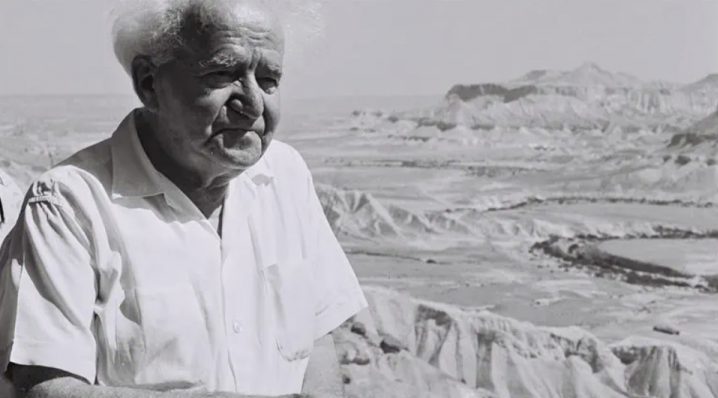Pure, innocent, naive idealism played a part in young early Zionists’ sacrifices. Their mistake was believing that the Arabs would want to be part of their utopia. The early Zionists were massacred — and then blamed for starting the fight.Op-ed.
Dr. Rae, whowrites the newsletter, “Dr. Truthfinder,” wrote this post as a guest of Future of Jewish, the ultimate newsletter by and for people passionate about Judaism and Israel.
The “Palestine Studies” revisionists must have realized their dilemma when they set out to rewrite Israel’s history.
Actual early Zionist ideology would be highly appealing to young people. After all, it was a socialist movement; the early Zionists imagined a united utopian Palestine with everyone equal and all property shared among the masses. (cf. the kibbutz)
Their mistake was assuming the Palestinian Arabs would want this as well, since the majority barely had enough food and possessions to stay alive before “the Zionists” arrived on the scene.
So how did nefarious actors turn this around and make Zionism a dirty word, while taking advantage of a myth about the secretive Jewish conspiracy for world dominance?
Well, “Zionism” and “Nazism” sound somewhat similar, so the revisionists set out to make people associate Zionism with Nazi fascism and ethnic cleansing. Instead of the truth — that Palestinian Arabs were massacring Palestinian Jews — they edited the historical timeline, omitting key information to make it appear the opposite.
“Zion” is in the name of the forged, slanderous document, “The Protocols of the Learned Elders of Zion,” which pretended to be an eye-witness account of a secretive Jewish conspiracy to control the world. It must have been quite a task to sift through Zionist documents to cherry pick quotes out of context and make it seem that Jews wanted to quietly “disappear” the Arab population, to take advantage of the trope of the sinister Jew, preying on the innocent, sucking up the lifeblood of the Palestinian Arabs by stealing their land. All from one quote, taken out of context and used to represent all of Zionism.
“We shall try to spirit the penniless population across the border by procuring employment for it in the transit countries, while denying it employment in our country. But the process of expropriation and the removal of the poor must be carried out discreetly and circumspectly.”
You will find this quote in virtually every anti-Zionist text, many of which claim that Theodor Herzl¹ wrote this in Der Judenstaat (German for “A Jewish State”), which outlined his plan for a Jewish state. He did not. Der Judenstaat makes no mention of this.
Instead, Herzl wrote the proposition in his diary on June 12, 1895, an idea that came up when he was brainstorming several ideas, most of which never happened. Despite this, there are numerous false claims that this statement represents Zionism. Left out is the fact that he was considering Argentina, a vastly bigger country, not the biblical Land of Israel.
Rarely is it mentioned that he also said, “It goes without saying that we shall respectfully tolerate persons of other faiths and protect their property, their honor, and their freedom with the harshest means of coercion. This is another example in which we shall set the entire old world a wonderful example.”
He was throwing out multiple ideas at once, to see what would stick, in what could almost be considered a manic manner. He even noted:
“For me, these notes are not work, but only relief. I am writing myself free of the ideas which rise like bubbles in a retort and would finally burst the container if they found no outlet. … Some people will think me a megalomaniac.”
He did not intend for his ideas to be secret: “My papers … will be an imperishable treasure of all mankind. Of all mankind, not merely the Jews.” He later noted, “I know now, and knew throughout that whole tempestuous period of production, that much of what I wrote down was wild and fantastic.”
Revisionists leave out the fact that he never once referred to “Palestine” in the entry. He twice mentioned the expropriation would be voluntary, and the reason he wanted it to be discreet was because he feared antisemites would try to prevent a Jewish state and that landowners would price-gouge if they knew Jews wanted the land.Rarely is it mentioned that he also said, “It goes without saying that we shall respectfully tolerate persons of other faiths and protect their property, their honor, and their freedom with the harshest means of coercion. This is another example in which we shall set the entire old world a wonderful example.”
He was throwing out multiple ideas at once, to see what would stick, in what could almost be considered a manic manner. He even noted:
“For me, these notes are not work, but only relief. I am writing myself free of the ideas which rise like bubbles in a retort and would finally burst the container if they found no outlet. … Some people will think me a megalomaniac.”
He did not intend for his ideas to be secret: “My papers … will be an imperishable treasure of all mankind. Of all mankind, not merely the Jews.” He later noted, “I know now, and knew throughout that whole tempestuous period of production, that much of what I wrote down was wild and fantastic.”
Revisionists leave out the fact that he never once referred to “Palestine” in the entry. He twice mentioned the expropriation would be voluntary, and the reason he wanted it to be discreet was because he feared antisemites would try to prevent a Jewish state and that landowners would price-gouge if they knew Jews wanted the land.
In the same entry, he wrote:
“Those South American republics must be obtainable for money. … Discreet, delicate investigations should first be carried on regarding the financial needs, the internal political situation, and currents in these South American republics. On the whole, it will be a voluntary parting with the land.”
Instead of reporting the truth, the “Palestine Studies” revisionists repeatedly distort the meaning of this quote to pretend it was part of a sneaky Zionist conspiracy to “disappear” people. Pretty sneaky of the revisionists, isn’t it?
The propaganda book, “The Hundred Years’ War on Palestine” by Rashid Khalidi, uses this quote to reframe Herzl’s reassurance to Khalidi’s third great uncle, Yusef Diya, an Arab Palestinian leader, as a “chilling” Jewish lie. He opens his faux history book with a letter between Yusuf Diya and Herzl. He dismisses the part of the letter in which Yusuf wrote:
“You are well aware that I am talking about Zionism. The idea in itself is only natural, beautiful and just. Who can dispute the rights of the Jews to Palestine? My God, historically it is your country! And what a marvelous spectacle it would be if the Jews, so gifted, were once again reconstituted as an independent nation, respected, happy, able to render services to poor humanity in the moral domain as in the past!”
This was a clever ploy to thwart Hertz’s evil secret plan. When Herzl assures Yusuf that he has no plans of uprooting the Arabs, Khalidi calls it chilling and conniving because of the 1895 quote. He turns Herzl’s earnest wish to improve the lots of both Arabs and Jews into a sinister plot to “disappear” Arabs.
Why don’t they quote what the Zionists were actually saying?
For example, in 1907 a Zionist worker from Petah Tikva², wrote: “We have come to the people who live here. Jews and Arabs alike. Our job is to forge them all into one revolutionary, proletarian mass. … The socialist Zionists shared the aim of not only reconstructing a land and creating a haven for the persecuted, but of establishing a ‘good,’ ‘just,’ even ‘morally perfect’ society as well.”
I have become simultaneously happy, sad, and angry after recently discovering the book that contains the above quotes, “The Israelis, Founders and Sons” by Amos Elon, initially published in 1971. Since it was written only 23 years after Israel’s founding, and four years after the 1967 Six-Day War by an author who had moved to Mandatory Palestine in 1933 at age 7, he was able to accurately document Israel’s history.
In addition, he had excellent credentials by leftist organizations. He had been a reporter for Ha’aretz, an Israeli newspaper that is frequently critical of the Israeli government, he has been quoted in “Palestine Studies” programs, and has been published by Columbia and Harvard Press.
No Palestinian Arabs were screaming that he misrepresented their history; quite the opposite, his books were offered for sale on “Palestine Studies” websites. He expressed empathy with Palestinian Arabs and referred to the European Jews who returned to their historic homeland as “colonists.” (Obviously, I disagree, as that is patently untrue.) So one can assume his observations of Israel should be accepted by all Palestinian Arab historians.
This is what Elon wrote:
“The social vision of Zionism was not inspired by the prophets, as is often erroneously thought, but by the humanist principles of Western Europe, liberalism, and by the dreams and strivings of Russian radicals and revolutionaries, Tolstoyans, socialists and others aspiring to a society not merely just, but supremely just.”
He noted that the Zionists never intended for the Arabs to leave, writing: “This is not how the Zionist pioneers intended it. Quite the contrary, they had hoped that two nations, Jews and Arabs, could live peacefully and amicably for the benefit of both.”
The early Zionists were described as young idealists, very much like the youth of today. According to Elon:
“There were globetrotters and avowed pacifists, draft dodgers of the Japanese-Russian War of 1905 and Jewish disciples of Tolstoy; fanatic vegetarians repelled by all violence, exalting celibacy, detesting formal organization, and repudiating the ideas of the state, established religion, and most modern comforts as well. They cultivated long-flowing beards and let their hair grow over their naked shoulders. Some wore only clothes of self-spun, rough gray flax, and when they were not barefoot, shoes made of cloth.”
“There are few instances in modern history when the image of things overshadowed reality as thoroughly as it did in Palestine in the first half of the twentieth century. One can think of no other country where a Utopian state of mind persevered for so long a time.”
“Pure, innocent, naive idealism played a part…”
“Their mistake was believing that the Arabs would want to be part of their utopia.”
“The nineteenth-century prophets of Zionism overlooked the possibility of native opposition. … There was always the implied or expressed assumption that Jewish settlements would benefit the Arabs greatly. For this reason the Arabs themselves were considered potential Zionists; they were expected to welcome the Jews as a matter of course. For the prophets of Zionism this was so self-evident that they never even considered another possibility.”
According to Elon, they believed: “Only the reactionary Arab feudalists are opposed; the masses of people will soon realize their true advantage; objectively they are allies. … Arab feudalists fan and exploit anti-Zionist feelings in order to dampen popular dissatisfaction with their miserable rule.”
Repeatedly, unequivocally, Zionists emphasized they had no intention of displacing Arabs, but wanted to help all working people.
So the response, massacres of Jews, was a shock.
According to Elon, the State of Israel’s first prime minister, David Ben-Gurion, wrote in 1967 that “none of the great thinkers who dreamed and wrote of our people’s revival in its ancient cradle ever envisioned that this revival would be met, from the first day on, by military attack.”
Multiple unprovoked attacks against Jews were documented. In the mixed towns of Jerusalem, Hebron, and Jaffa, Arab mobs ran amok and brutally massacred Jewish women, children, and helpless old men.
At first, the early Zionists thought the attacks were provoked by antisemitic Christians. The descriptions of the attacks, including the Arab attacks on Jews in the 1948 First Arab-Israeli War (also known as modern Israel’s War of Independence), make it clear that they were initiated by Arabs and the Jews responded in self-defense.
Revisionists often claim that the 1967 Six-Day War was an aggressive land grab by Israel. This book, published four years later, documents what it really was, an attempted massacre by Arab forces.
Four Arab states — Egypt, Syria, Jordan, and Iraq — had concentrated enormous, threatening forces opposite Israel’s long, exposed borders. Total Arab strength, at least on paper, had vastly outnumbered that of Israel. The Arabs had twice as many troops, over three times as many tanks, and more than three times as many combat aircrafts.
At the same time, Arab leaders had threatened genocide and destruction. One much quoted Arab rabble-rouser, Akhmed Shukcity, then-head of the Palestine Liberation Organization, had announced: “Those native-born Israelis who will survive the war will be permitted to remain in the country. But I don’t think many will survive.”
More careful with his words but hardly less ominous in his threats, then-President Gamal Abdel Nasser of Egypt had proclaimed that the very existence of Israel was “in itself an act of aggression.” The Syrian Defense Minister, General Hafiz al-Assad, declared: “The army, which has long been preparing itself for battle and has a finger on the trigger, demands in a single voice that the battle be expedited. … The time has come to wage the liberation battle.”
Iraqi troops, already stationed on Jordanian soil, had been told by their deputy Chief of Staff: “Au revoir in Tel Aviv and Haifa!” In the streets of Cairo, the mobs had run amok for days, crying for blood into the microphones and cameras of international television reporters. Egyptian television broadcasts, easily received in most parts of Israel, had driven this message home to tens of thousands of Israeli viewers. They heard the wild chants, and saw the war flags inscribed with black death skulls, and the faces of the mob as it screamed for war.
For two or three weeks prior to the Six-Day War, Israelis had shared a sense of anguish and dread. The incredible victory in the field alleviated the anguish, but had elicited little pride of triumph. The army of reservists, mobilized overnight, had quietly returned home, tired rather than festive, disgusted with war rather than elated by its outcome. They later assumed that of course the Arabs would trade back the land that was gained in exchange for peace, but were sadly disappointed.
They were the opposite of fascists! How dare the faux historians distort their memory!
So no, Zionists were not aggressive, violent people stealing land. Elon repeatedly provided documentation that Zionists bought the land rather than stole it, sometimes compensating the Arabs who had farmed the land, even though they didn’t own it, for far more than it was worth.
He also noted that much of the land was swampy, deserted, and diseased. Besides the swamps, “large stretches of the country were still barren, transverse only by a dirt track. … Disease was still rampant. There was hardly a chalutz who escaped malaria. … Dysentery, rheumatism, typhoid, skin and eye diseases were all common.”
I’m happy I discovered this book, because it confirms my memory of Israel’s history.
Sad, because of how we have allowed Israel’s history to be so subsequently distorted.
Angry, at the extent of the gaslighting. It refutes several myths, many of which are reported as facts on the United Nations and “pro-Palestinian” websites:
-Zionists were aggressive colonialists who wanted to destroy Palestinians.
-Zionists were supported by the British.
-Zionists initiated attacks against Palestinians to steal land, rather than defending themselves against attacks by Arabs.
-Mandatory Palestine was not underpopulated and filled with swampy or desert land.
Raising of the Ink Flag in March 1949, marking the end of the 1948 war (photo: Micha Perry/IDF Spokesperson’s Unit)
The revisionists are murderers in at least three dimensions. They have supported the terrorists who massacred our tribe. They have murdered our reputation in the cruelest way possible — taking the worst things that were done to us, and making people think we did these things to them.
Our people, to stop being murdered by Arabs, fought back in self-defense, but antisemites have convinced people that it was the other way around. They have murdered our identity in our children’s minds, those who should be proud of the hard-working, self-sacrificing young Zionists who wanted to change the world.
Instead, many of our Western youth, ashamed of what they been taught to believe about the brave young Zionists, have forsaken their heritage. Our people were murdered by Nazis, and revisionists have convinced people that we are the Nazis.





